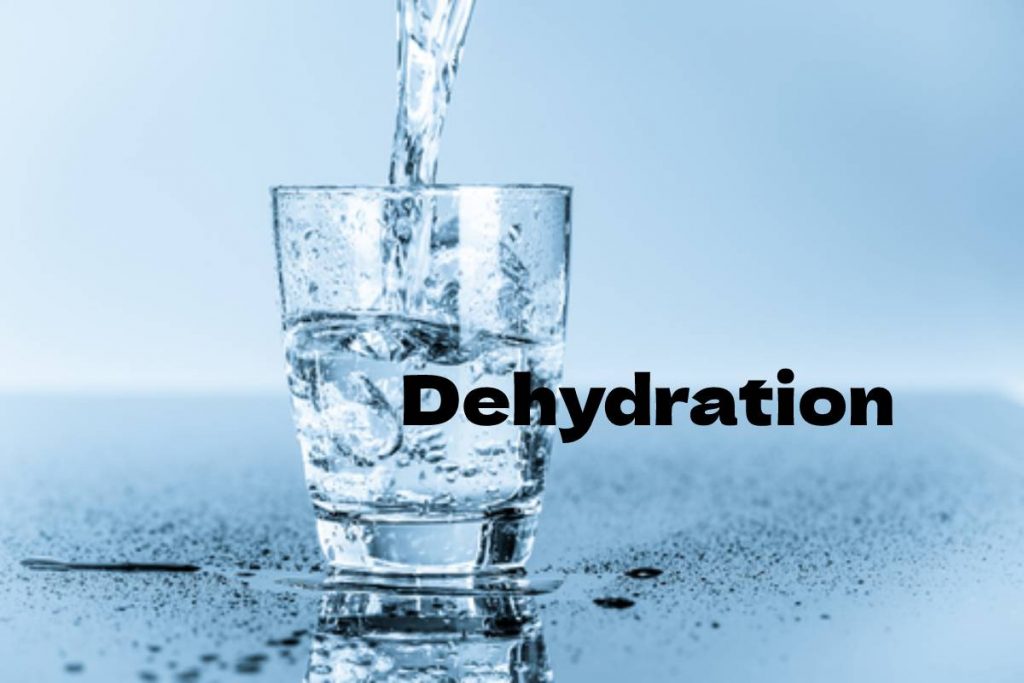Table of Contents
Definition
Dehydration occurs when the body loses more fluid than consumed. Especially water; the human body loses water during daily physical activity through evaporation of breathing, sweat, urine, and feces.
Hence, with the loss of water, the body also loses a small number of salts against the amount consumed. Resulting in a negative balance that leads to dehydration, a severe drought that can lead to death.
Mechanisms Of Dehydration:
Loss of water.
Lack of fluid intake.
Symptoms Of It
So, minor or severe symptoms may appear as a dry state.
1. The First Symptoms Of Dehydration
one of the essential initial symptoms of it is:
Thirst.
Dry mouth.
General weakness.
Palpitation.
2. Advanced Symptoms Of Dehydration
Hence, if the body is not compensated for lost fluids and fills the shortage so, the drying situation may worsen, then the following will occur:
Cluttered.
Loss of consciousness.
Convulsions.
Convulsions.
Dark urine colour.
Causes and risk factors of dehydration
there are many causes, and the risk that causes dehydration is treated.
Causes Of Dehydration
It occurs in the following circumstances:
High body temperature in diseases accompanied by fever or exposure to high temperatures, where sweating increases.
Excess physical activity accelerates water loss from the body. Especially in environmental conditions characterized by high temperature and high humidity.
Frequent vomiting.
Persistent diarrhoea.
Urination at a high rate may be caused by urinary tract inflammation or taking large amounts of diuretics in people with diabetes or other diseases such as diabetes insipidus.
Deep skin burns.
At-risk groups
The Most Important Groups At Risk Are:
So, children, the elderly, or non-independent seats need other people to provide them with water regularly.
Patients are breathing by artificial respiration.
Coma patients who are supplied with water externally.
Fasting in specific categories.
dehydration complications
Failure To Treat Dehydration Causes The Following Complications:
problems with the urinary system and kidneys.
Epilepsy.
Hypovolemic shock.
Diagnosis of dehydration
urine and blood tests may help diagnose dehydration.
1. Urine Test
in the case of it, the colour of the urine is dark; the results of its analysis indicate that:
Glucose concentration in urine is high, which may indicate the presence of diabetes.
Hence, an increase in protein concentration indicates a risk of kidney disease.
Since urine testing can show signs of inflammation as a cause of it.
2. Blood Test
Plasma analyses may show high levels of salts (Hypernatremia) and a high level of urea and creatinine, which indicate the severity of it.
As a result, Blood typing indicates the cause of dehydration, as many white blood cells indicate inflammation as a potential cause of it.
Treatment Of Dehydration
Treatment of a patient with it depends on the seriousness of the condition.
1. Home Therapy
Home therapy is a primary treatment in cases of simple dehydration, in which the amount of fluid is tried to be returned to the body slowly and gradually, as follows:
Drink sweetened liquids to help return some of the salts the body has lost with fluids.
Drink water slowly but continuously and continuously. So, it returns a large number of fluids to the body.
Moreover, avoid the rapid return of lost fluids in the event of dehydration, as symptoms may worsen due to an imbalance between blood salts.
So, try to lower the high temperature with medications, take off excess clothes, and refrain from scorching places.
Therefore, a suspected free-kick should effectively reduce body temperature by keeping the patient in a well-conditioned room, along with a fan, or placing wet towels or wet cloth on his body.
2. Hospital Treatment
However, treatment of a patient with dehydration in hospital includes the return of several fluids to the body by:
Intravenous infusion of fluids.
So, try to diagnose and treat the direct factor that caused it, such as antibiotics against germs, insulin for diabetics, and repair the imbalance in the body’s salt balance.
Prevention Of Dehydration
Overall, despite the risks of dehydration, adherence to prevention measures prevents it, the most important of which are:
Awareness is essential, and the necessity of drinking liquids in large quantities to prevent dehydration. Therefore, provide an appropriate amount of water, especially in hot and humid weather, when making a tremendous physical effort and exercising.
So, ensure that children, the elderly, and the seated drink enough water taking into account their health status. And the environmental conditions surrounding them.


